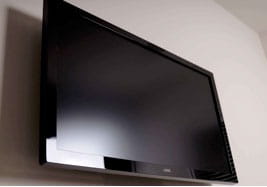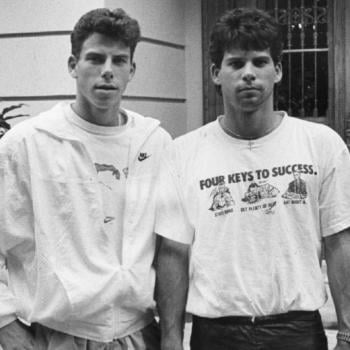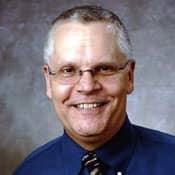 Early in February, my wife and I confronted a situation that radically altered our little universe.
Early in February, my wife and I confronted a situation that radically altered our little universe.
Our cable box died.
The cable company told us it would be a week before someone could stop by to replace it.
Now, this wasn't really an issue to my wife, who doesn't watch much TV anyway. The biggest inconvenience, as far as she was concerned, was that when she passed through our den, she could no longer glance at the cable box to check the time. She had to walk an extra ten steps into the kitchen.
She endured this inconvenience like the hardy pioneer woman that she is.
But for me, this was catastrophic. For one thing, our TV is not small: it's a 50- inch flat-screen behemoth. It dominates the room. Anyone who passes before it is forced to acknowledge its presence. It commands attention. (Media is like that anyway, isn't it?) So when I went into the den to plop on the couch and pick up something to read, the TV stood there, glowering at me, like Darth Vader.
 I ended up going into the living room.
I ended up going into the living room.
For another thing, I found myself with large pockets of time waiting to be filled. This was no small matter. I couldn't watch Anderson Cooper or the local weather forecasts. (People may debate about whether or not that's a good thing.) But I also couldn't watch "The Office," "30 Rock," or "The Big Bang Theory." I was robbed of TV Land re-runs of "Everybody Loves Raymond." The laugh track of my life fell silent.
That's not to say I didn't hear television; once in while, the guy who lives in the apartment under us would crank up his giant surround-sound media system to watch tender tear-jerkers like Apocalypse Now or Lethal Weapon IV. The floor vibrated.
But our own home had become a television-free zone.
How to fill the time? Well, for one thing, I actually began to read, deeply. I found myself dawdling over the Liturgy of the Hours, dipping into the Office of Readings. I put the Kindle I got for Christmas to good use, downloading Henri Nouwen and Timothy Keller and re-reading favorite parts of Thomas Merton. I spent some time tidying up my bookshelves and throwing out old magazines and organizing my home office into something that didn't look like a disaster area in need of the Red Cross.
My wife and I rediscovered the lost art of conversation. We spent more time lingering over dinner, musing about the lousy weather and dreaming about spring. We finished our taxes. We fussed about our bills and how one of us (okay: me) tends to be a little too wild and crazy with the credit cards. A couple of nights, we prayed the rosary.
And after a few days of this, I found that yes, there is a life out there without TV—a surprisingly rich and fulfilling life, at that. A life where things like prayer and holy reading and thoughtful conversation with someone you love can easily supplant sitcoms and tacky talk shows.
But then the gal from the cable company showed up at our door one afternoon, lugging a new cable box. In about ten minutes, she disconnected the old one, plugged in the new one, and disappeared out the door, leaving us alone with a TV that was, once again, working.
The fluorescent blue light on the front of the box blinked the time. Normalcy seemed about to return.
I clicked on the remote and surfed. No matter what channel I hit, every one seemed to be running commercials for devices that promised to expand the space in your closet or collect more dust from your ceiling fan. This was what I had been missing?
It's a cliché, but it's true: in our modern age, we are perpetually being distracted, disarmed, put upon, blitzed. The discovery of a way to transmit electric current into the American home was a marvel—and a menace. One result: we now stay up late watching colored lights in a flat plastic box, and in the process we are being wooed to buy things we never needed to fill holes in our lives that we never knew existed.
But when you take that away, you realize what the real hole in your life is.
It's interior. It's that place where you go to try and pray, or to try and think. It's listening to the breathing of another, or the steady beat of a loved one's heart. It's hearing for the first time, really, the delicate whisper that the page of a breviary makes as it is turned. It's noticing, for the first time, the low rumble of a train half a mile away, as the Long Island Rail Road hurtles homeward in the evening, carrying bankers and accountants and newspaper vendors and short order cooks to places like Lynbrook and Elmont.
It's understanding, I think, why monks and nuns rise in the middle of the night to hear nothing, and then listen to what that nothing has to say, and respond to it with wordless prayers of praise and thanksgiving, abetted by the gentle, persistent chanting of the psalms.
My week without TV taught me this much: going without can often mean going within—discovering other ways of seeing, hearing, listening, focusing.
And with Lent, a season of sacrifice and repentance, just a week away, that's a good lesson to remember.
3/2/2011 5:00:00 AM





